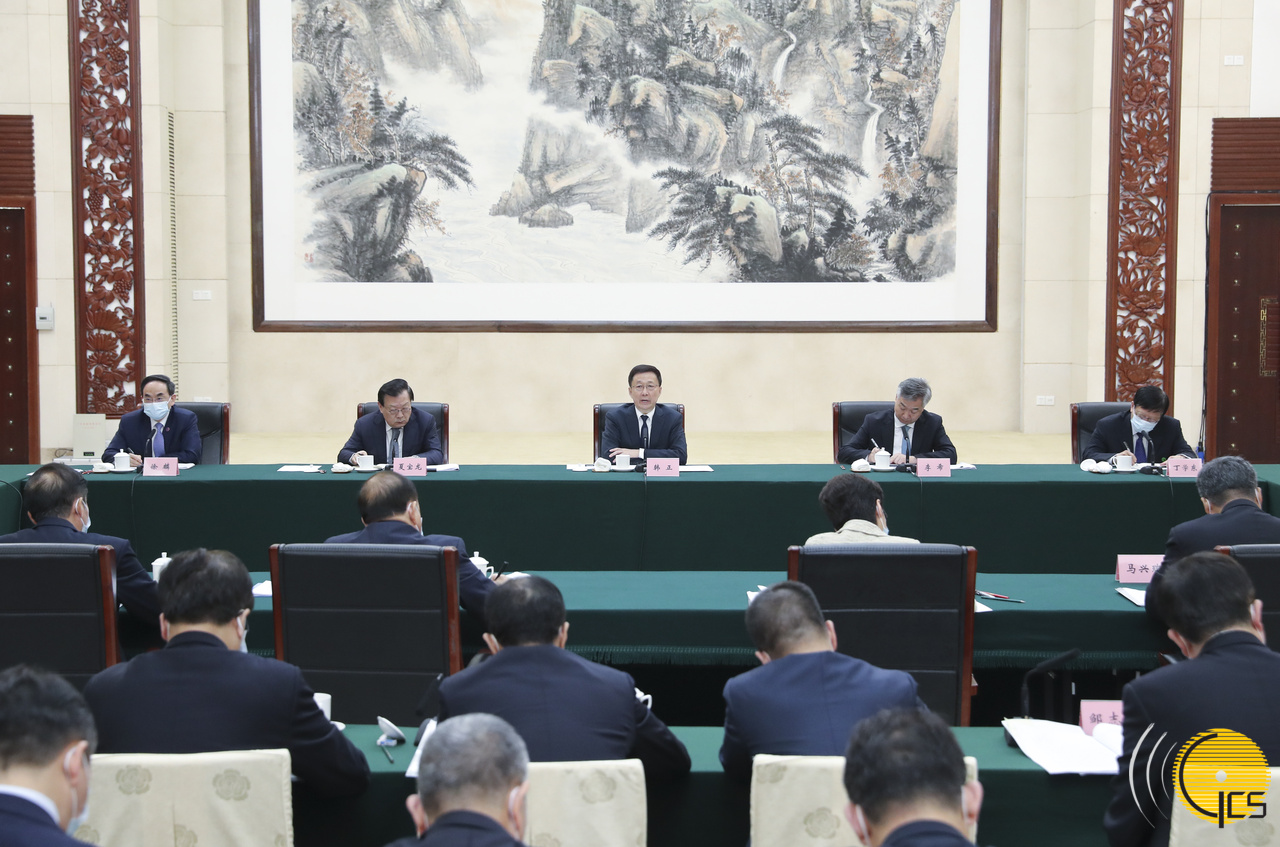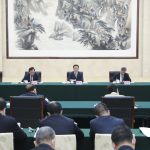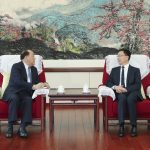 A themed meeting of the Leading Group for the Development of the Guangdong-Hong Kong-Macao Greater Bay Area is held in Guangzhou, Guangdong Province and is chaired by member of the Standing Committee of the Political Bureau of the CPC Central Committee, Vice Premier of the State Council, and the head of the Leading Group for the Development of the Guangdong-Hong Kong-Macao Greater Bay Area, Mr Han Zheng. (Photo from Xinhua)
A themed meeting of the Leading Group for the Development of the Guangdong-Hong Kong-Macao Greater Bay Area is held in Guangzhou, Guangdong Province and is chaired by member of the Standing Committee of the Political Bureau of the CPC Central Committee, Vice Premier of the State Council, and the head of the Leading Group for the Development of the Guangdong-Hong Kong-Macao Greater Bay Area, Mr Han Zheng. (Photo from Xinhua)
The Chief Executive, Mr Ho Iat Seng, said advancement of the Guangdong-Hong Kong-Macao Greater Bay Area would always be at the forefront of the Macao Special Administrative Region (SAR) Government’s work. He added all-out effort would be made to support strategic decisions taken by the Leading Group for the Development of the Guangdong-Hong Kong-Macao Greater Bay Area.
Mr Ho made the remarks during a themed meeting of the Leading Group, held on Thursday (22 April) in Guangzhou, Guangdong Province.
In the meeting, member of the Standing Committee of the Political Bureau of the Central Committee of the Communist Party of China (CPC), Vice Premier of the State Council, and the head of the Leading Group for the Development of the Guangdong-Hong Kong-Macao Greater Bay Area, Mr Han Zheng, gave instructions on the major work required in relation to Greater Bay Area advancement.
In his remarks delivered at the meeting, Mr Ho expressed his gratitude for the support and care for Macao conveyed by Mr Han, as well as that from ministries and departments of the Central Government.
The country’s 14th Five Year Plan covered a crucial period in which Macao could integrate further into national development, and the plan created fresh momentum for local initiatives. Macao was formulating the SAR’s second Five-Year Development Plan, which would span the period 2021 to 2025. The plan would be compiled in accordance with the need for high-quality development of the Greater Bay Area, as outlined in the 14th Five Year Plan. It would also be in line with Macao’s strategic positioning as a world centre of tourism and leisure; as a commercial and trade cooperationservice platform between China and Portuguese-speaking countries; and as a multiple-culture exchange and cooperation base with an emphasis on Chinese culture (collectively known as the centre, platform, and base policies).
Macao’s second Five-Year Development Plan would focus on how to facilitate adequate economic diversification, and how to promote comprehensive development in relation to livelihood issues faced by Macao people.
Regarding development of the Guangdong-Macao Intensive Cooperation Zone planned for Hengqin, the Macao SAR Government would devote further effort to realise aspirations raised by President Xi Jinping in key speeches, and to implement comprehensively and precisely the “One country, two systems” principle. Such effort would help Macao reach fresh heights, and serve the country with greater strength, including by working with Zhuhai in the development of the Guangdong-Macao Intensive Cooperation Zone planned for Hengqin.
Once the overall development plan for the Guangdong-Macao Intensive Cooperation Zone in Hengqin was published, Macao would work more closely with the Guangdong Government and the Zhuhai Government, in pressing ahead with the work mentioned in it.
The Secretary of the Guangdong CPC Provincial Committee, Mr Li Xi; the Director of the Hong Kong and Macao Affairs Office of the State Council, Mr Xia Baolong; and the Chief Executive of the Hong Kong SAR, Mrs Carrie Lam Cheng Yuet-ngor, and other members of the Leading Group also attended the meeting.



